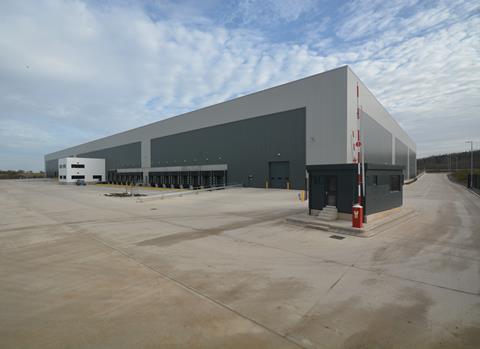The trend we have all been witnessing for the greater adoption of online commerce is expected to remain strong as the UK population ages and as advances in technology make it easier for manufacturers and retailers to reach the end consumer.


The provision of logistics stock has never been so critical, as the Covid-19 pandemic has accelerated what was initially a long-term consumer trend that started consolidating three years ago in the UK. Supply chains are being tested in an unfavourable economic climate with rising consumer expectations about speedy deliveries. This is all happening in a low-supply environment for distribution warehouses and against the backdrop of a growing population.
A larger population with increasing ecommerce penetration will continue to create further competition for land, with a greater need for residential and industrial development to accommodate the delivery of dwellings.
‘What Warehousing Where?’, a report released by the British Property Federation in association with Turley, estimates that there is 69 sq ft of warehouse floorspace for every home in England. Therefore, the more houses we build, the more industrial warehousing space is needed to accommodate the e-fulfilment requirements of each household.

This puts even more pressure on the government to classify the provision of warehousing space as critical infrastructure. Yet some may argue that the process for obtaining planning permission for logistics sites is not as streamlined as occupiers and property developers need it to be to bolster the required availability of new sites.
Occupiers are finding it increasingly difficult to fulfil their requirements and we do not expect this to change any time soon, particularly given the other major factors that are expected to drive demand further into 2021 and beyond.
The fourth industrial revolution: the rise of automation
The pandemic has certainly accelerated the uptake of new technologies and sped up the fourth industrial revolution, with occupiers increasingly recognising the need to invest in automation and potentially exploring the use of artificial intelligence to meet customer expectations. In the past, logistics occupiers used to store goods in a low-tech environment, predominantly creating jobs for low-skilled workers. As occupiers continue to invest in their supply chains, more skilled workers will be needed, hence increasing productivity output. We expect the sector to require more software and machine engineers, while also supporting job creation in the wider economy.
According to the latest The Future of Jobs report published by the World Economic Forum in October 2020, the adoption of cloud computing, big data and ecommerce remain high priorities for business leaders. While the report forecasts that by 2025, the work hours performed by machines will match the time spent by human beings, it also highlights that technology-driven job creation globally is still expected to outpace job destruction over the next five years.
Demand for chilled space: Brexit
The UK is negotiating with the European Union (EU) on our future trading relationship with the bloc. It is possible that the UK/EU trading framework could revert to the World Trade Organisation tariff system in January 2021; equally, we could end up with a trade agreement ratified. Either way, it would not be unexpected if some custom checks were introduced, particularly in the short term.
If we look at the grocery sector and the provision of food produce, the largest food import market for the UK is unquestionably the EU, which accounts for 26% of all unprocessed food consumed in the UK.
If the UK were not to agree to some sort of free trade agreement with the EU, it would bring about some downside risks to the food supply chain and the wider economy over the short term due to our highly interlinked trade flows.
In our view, demand for chilled warehouse space will increase as the potential introduction of customs checks for food importers will require occupiers to sit on larger inventories. We therefore expect to see greater occupier demand for logistics space in port-centric and gateway distribution hub locations.
New entrants
The UK ecommerce market is the third-largest worldwide after China and the US. According to estimates by Ascential, Amazon dominates the UK ecommerce market with a share of 30.1%, accounting for $30bn (£23.16bn) in sales in 2019.
The second biggest player is eBay, which accounts for a 9.8% share of the online market, followed by Sainsbury’s (4.6%), Tesco (4.5%), Asda (3.9%) and John Lewis (3.6%).
Over the coming years, it would not be surprising if we were to see other ecommerce players trying to enter the UK market as advances in technology further drive ecommerce penetration in the country. Greater provision of logistics space will be needed as e-fulfilment operations require nearly three times as much space as bulk storage.
To conclude, the pandemic-induced economic malaise will continue to affect our lives over the coming quarters with an increasing unemployment rate negatively impacting aggregated household consumption. That said, due to the occupier race to upgrade their logistics networks, in a fast-changing consumer landscape, we expect occupational demand to remain sustained.
This will affect the industrial sector in the foreseeable future as greater adoption of automation takes place to bridge the gap between current supply chain constraints and the increasing demand for higher efficiency savings.
Learn more about Colliers Industrial team and their capabilities here:
About Colliers International
Colliers International is a leading real estate professional services and investment management company. With operations in 68 countries, our more than 15,000 enterprising professionals work collaboratively to provide expert advice to maximize the value of property for real estate occupiers, owners and investors. For more than 25 years, our experienced leadership has delivered compound annual investment returns of almost 20% for shareholders. In 2019, corporate revenues were more than $3bn (£2.28bn), with $33bn of assets under management in our investment management segment. Learn more about how we accelerate success at corporate.colliers.com, Twitter or LinkedIn.































No comments yet